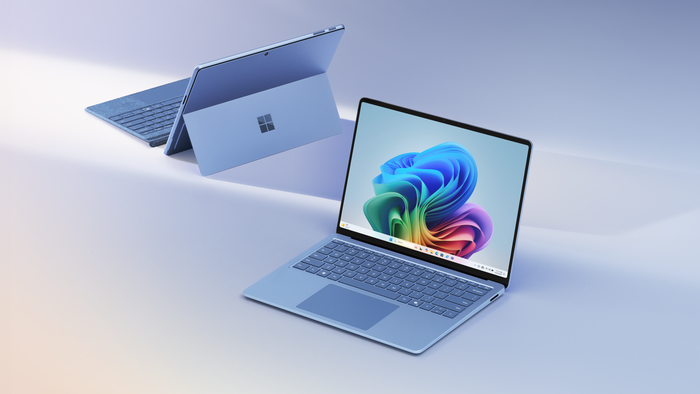Microsoft Launches AI Copilot+ PCs: Fastest, Smartest Windows Devices YetMicrosoft Launches AI Copilot+ PCs: Fastest, Smartest Windows Devices Yet
New Windows laptops feature custom AI chips, powerful language model capabilities, and AI productivity tools.
.jpg?width=1280&auto=webp&quality=95&format=jpg&disable=upscale)
This article originally appeared on AI Business.
Microsoft has unveiled a range of AI-infused consumer-focused PCs, claiming the devices are the “fastest, most intelligent Windows PCs ever built.”
The new Copilot+ Windows PCs boast custom silicon to allow improved performance running AI and machine learning applications as well as a variety of AI features to improve productivity.
Microsoft says the new AI PCs are 20 times more powerful and up to 100 times as efficient for running AI workloads compared to rival devices.
The PCs include AI features like Copilot, Microsoft’s AI assistant tool that users can activate from the new shortcut key, the first keyboard update since 1994 when it added the Windows key. In a boost to its AI assistant, Microsoft announced it is adding OpenAI’s new GPT-4o model to power Copilot’s voice conversations, making them sound “more natural.”
Copilot+ PCs users can use applications like Cocreator to generate AI images at speed and an AI-powered tool called Live Captions which translates audio from more than 40 languages into English.
The new devices can handle running large language models while connected to Microsoft’s Azure Cloud service. The PCs can also leverage Microsoft’s range of small language models, like the new Phi-3 mini, to power AI workloads directly on the device.
“We have completely reimagined the entirety of the PC from silicon to the operating system, the application layer to the cloud with AI at the center, marking the most significant change to the Windows platform in decades,” said Yusuf Mehdi, Microsoft's chief consumer marketing officer.
Power, Performance to Rival Apple’s Mac
The PCs are powered by a custom Neural Processing Unit (NPU), a specialized processor designed specifically for neural network tasks.
The first line of Copilot+ PCs will also feature Snapdragon X Elite and X Plus processors and an Adreno GPU from Qualcomm.
Microsoft claims the custom hardware enables the Copilot+ PCs to perform 40 trillion operations per second (TOPS). The hardware powering the Microsoft AI PCs will be expanded to include systems from other vendors including Intel, AMD and Nvidia, the company confirmed.
Each device also contains a Microsoft Pluton Security processor to keep workloads running on Windows 11 secure.
Microsoft’s Copilot+ PC range will start from $999, cheaper than Apple’s Mac devices, one of Omdia’s AI PC market leaders.
Microsoft claims its devices outperform the $1,299 Apple MacBook Air 15” in multithread performance.
The new Copilot+ PC range also boasts an all-day battery life, offering up to 22 hours of local video playback or 15 hours of web browsing on a single charge, 20% more than the MacBook Air, Microsoft claims.
The devices will be made available from manufacturing partners including Acer, Dell and HP.
Among the first line of Copilot+ PCs are the new ThinkPad T14s Gen 6 and Yoga Slim 7x from Lenovo. The devices use Microsoft’s AI and machine learning features to streamline tasks, Lenovo said upon announcement.
Other devices to feature Microsoft’s Copilot+ PC include Samsung’s new Galaxy Book4 Edge, the Vivobook S 15 from ASUS and HP’s OmniBook X AI PC.
Copilot+ PC will also be featured in Microsoft’s Surface brand of tablet PCs.
The all-new Surface Pro and Surface Laptop will house Microsoft’s new AI features as well as an improved touchscreen display, an AI-augmented camera and a haptic touchpad.

Surface Laptop and Surface Pro Hero
Making Searching for Files Easier
Searching for files is now more intuitive through the Copilot+ PC’s Recall, a feature designed to help users find what they’re looking for.
Microsoft claims that PCs organize information similarly to humans, based on relationships and associations to individual experiences.
A timeline that spans previously accessed applications, documents and websites lets users scroll to find a specific email or chat.
The AI-powered feature automatically takes snapshots, providing suggested actions during searches using object recognition.
“With Recall, you can access virtually what you have seen or done on your PC in a way that feels like having photographic memory,” the company said.
“We are at an inflection point where the PC will accelerate AI innovation,” Mehdi said. “We believe the richest AI experiences will only be possible when the cloud and device work together in concert. Together with our partners, we’re setting the frame for the next decade of Windows innovation.”
AI features in PCs are quickly becoming a focus for hardware and software developers. A recent Omdia report crowned Apple and Nvidia as frontrunners in this space but suggested there’s an opening for someone to capture the enterprise focus in this growing market.
Read more about:
AI BusinessAbout the Author
You May Also Like








.jpg?width=700&auto=webp&quality=80&disable=upscale)
